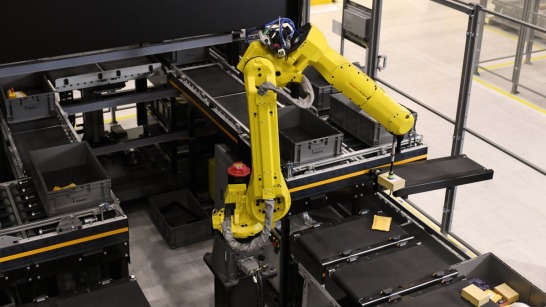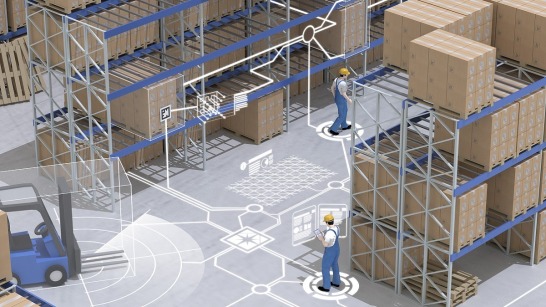The topics that the 15-member team, led by Hans Schotte, deals with daily include data analytics, cloud architecture, cloud applications, embedded software, testing and networked machines. “The world around us is changing,” the managing director explains, adding that “It’s moving toward greater connectivity and data exchange. Our task, then, is to provide a platform which allows our products to exchange data.” The platform, the KION Cloud, is the hub where the Wangen team’s ideas revolve. It is the interface where all information comes together and is available for intelligent use.
Seamless data exchange for smooth workflows
The cloud is one of many innovations where the digitalization specialists at KION IoT Systems ensure that the future expectations of KION brand customers are being met; especially when it comes to networking products or providing performance data in real time and in an uncomplicated format. The Wangen team is currently working on a variety of projects related to the cloud, user applications and communication gateways in forklift control units and warehouse technology.
One of the Wangen team’s priority projects is ‘Truck-to-Cloud’ (T2C), which involves setting up an infrastructure where vehicle data can be continuously transferred to the KION Cloud. It is a pioneering solution offering customers considerable benefits. “T2C provides greater transparency in terms of a fleet's capacity utilization. If this transparency allows a customer to use their fleet more efficiently, then they will immediately start saving money,” says Stefan Wenzel, a senior director at IoT Systems. Industrial trucks can also contact the service technicians via the cloud if repairs are required, or to indicate upcoming maintenance schedules. T2C is a good example of how the implementation of new technology leads to extended usage options that offer the customer considerable added value with improved efficiency and greater cost savings.
Unusual methods for exceptional results
Ever since they opened for business, the Wangen team’s mindset has been that a real paradigm shift in intralogistics can only be achieved through new, innovative technologies, services and business models once you move away from conventional approaches for developing ideas and solutions. It explains why they rely on unconventional methods such as ‘agile invention’ – using agile methods to create innovation – and scrum in their projects. Scrum is an agile framework based on the notion that many development projects are too complex to be put into a comprehensive plan since a substantial part of the requirements and the solution are still unclear at the outset. To avoid running into this wall, intermediate milestones are created, which can be used to find the missing requirements and solution techniques more efficiently than would be possible through a lengthy and abstract clarification phase. Thanks to a pragmatic approach which allows for the greatest possible focus with maximum flexibility, scrum helps the team find a solution faster.
Collaboration across locations
Collaboration happens in 3-week phases, known as "sprints", and extends across locations – the group in Wangen works with a sprint team at Linde MH in Aschaffenburg, Germany. Connectivity has been a development priority for some time since many customers want their trucks to do more than merely transport goods and merchandise. Thanks to the new 12xx generation, scheduled for rollout in late 2019, the digitally enabled truck will finally find its way into a customer’s warehouses and production sites. “Digital technology is future-proofing our trucks,” says Stefan Prokosch, a senior vice president for Product Management Industrial Trucks Counterbalance at Linde MH. “Our trucks are becoming more valuable to our customers since they can be more deeply integrated into their processes.” The trucks can report a problem themselves, actively intervene in hazardous situations, or help customers make their energy management more efficient in the future.
The Linde MH team has taken another important step forward with its ‘connect:desk’ solution. The software is part of a modular system offering customers all the benefits of digitalization in the warehouse, including driver and truck allocation to individual or multiple organizational levels, access authorization administration depending on truck type, driver's license and validity, maintenance planning and monitoring and training schedules. Using easily retrofittable hardware components, ‘connect:desk’ efficiently manages the entire fleet at a customer site. It is an industry ‘first’ and a considerable competitive advantage since no other vendor currently provides a solution that a customer can operate locally.
A strong network for innovation
Before too long, KION can offer customers even more cloud-based services, opening additional business models that demonstrate Group expertise. A well-connected global network with other locations in the KION Group allows the Wangen team to put their strengths to the best possible use and to continue playing an important role. It is what ensures that no question regarding the IoT remains unanswered within the Group.


